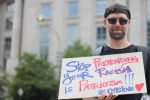The United States prides itself on being a nation of free speech. After all, the very first amendment added to our constitution in 1789 grants citizens the right to speak freely.
But, if the ability to speak openly is a fundamental American right, then why did Wisconsin lawmakers find it necessary to pass a bill in 2017 — 228 years after the implementation of the amendment — protecting it? The bill, which passed in a 61-36 vote along party lines on June 21 and is known as the Campus Free Speech Act, is currently awaiting approval from the state senate before it can become a law.
Still, the fact that lawmakers feel that the need exists to pass a bill to protect free speech is alarming. In an age in which Americans have a number of platforms they can use to express themselves, how is it that speech is less free than it was a few decades ago?
What is most confounding about the Wisconsin bill is that it became a party-line issue, one in which both sides claimed to be the champion of free speech. Republicans say the bill is necessary because controversial speakers should be protected under the First Amendment, but at many universities, protesters have caused disruptions that have prevented speakers from sharing their views. On the other hand, Democrats say that the First Amendment protects the rights of the protestors to speak out against the lecturer with opposing views.
Republicans cite the Ben Shapiro incident from last fall as an example of why the Campus Free Speech Act must be passed. Shapiro, a conservative media commentator, had just begun his lecture at the University of Wisconsin when protestors sprouted out of the audience, crying out “shame” and “safety” in an effort to drown out his speech.
According to reports, some of the protestors moved to stand in front of Shapiro, preventing him from continuing to deliver his speech, entitled “Dismantling Safe Spaces.” Campus police finally arrived and the protestors left, allowing Shapiro to finish his address.
In this scenario, regardless of your political leanings, it is clear that the students were in the wrong. While his rhetoric may be controversial, Shapiro is not inciting violence with his words or using his platform for hate speech. He is speaking his mind and sharing his opinion in a peaceful way, and the protestors have every right to do the same.
If they want to stay outside the building and hold up signs or stand in solidarity, they are free to do so. But being so disruptive as to impede the invited speaker from communicating with the audience was not only disrespectful, it also made it clear to Wisconsin lawmakers that not everyone’s speech was being protected on college campuses.
Lawmakers in other states have come to the same realization. For example, politicians took a similar approach to protecting free speech in Colorado by enacting legislation, and similar measures were introduced in Michigan, North Carolina, Virginia and California. State governments have found these protections necessary partly because the Shapiro incident was not an isolated one, nor was it even near the most serious.
The University of California Berkeley, for example, felt obligated to cancel an April speech that was to be delivered by Ann Coulter, an outspoken conservative commentator, because protestors posed a potential security threat. Yes, you read that right: Berkeley students prevented a woman from speaking on campus because her political views differed from theirs. It’s every bit as absurd as it sounds.
Democrats consider the bill a way to silence liberal voices on campus and allow conservative speakers to share their views unopposed. However, not every college campus has such an outspoken liberal body. In fact, in an instance in which a conservative campus would move to silence a liberal speaker, the Wisconsin bill would protect their right to free speech just as it would protect the conservative’s.
Plus, students have proven time after time that there are powerful ways to protest in non-violent ways. And, under the Wisconsin bill, students would be encouraged to express their views by means of protest, so long as they do so in an appropriate manner. If protestors refused to cooperate and instead demonstrated unlawfully, the legislation grants every student a warning offence. After two complaints about a student’s conduct during a speech or presentation, the school would take disciplinary measures that could lead to a hearing and subsequent semester-long suspension. A third offense would lead to the expulsion of the student.
College campuses are supposed to be a place for everyone to share their opinions, a place of diverse dialogue and elevated discussion. It should not be an echo chamber for people of either political party, of any viewpoint.
I am all for protesting and standing up for what I believe in. I think educating yourself about issues important to you and protesting injustices is not only the courageous thing to do; it is the right thing to do. But you can show your disagreement with someone and voice your concerns without silencing your opponent. And a bill like this one will, hopefully, prevent that from happening, allowing everyone who wants it the chance to speak.

















